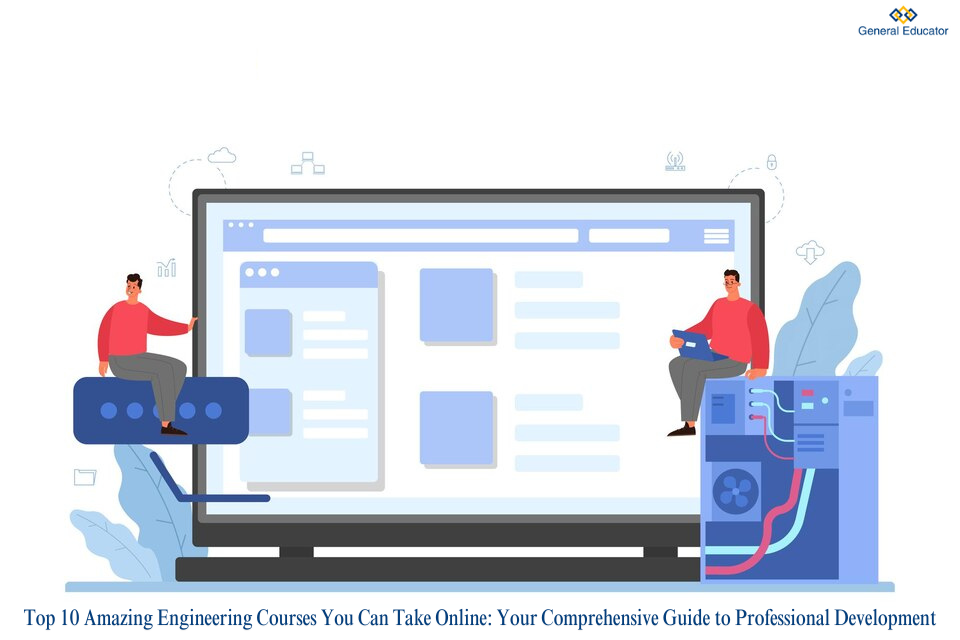Understanding the Landscape of Online Engineering Education
Engineers face an unprecedented challenge in today’s rapidly transforming technological ecosystem: living up to the latest advanced technologies and new areas of profession. Distance learning has now become the new frontier in postgraduate engineering courses opening new doors for learning that are convenient, elastic, and well rounded.
The growth of the digital learning system has given freedom to the technical world to get into new and innovative dimensions for professionals and students as they gain education from internationally recognized institutes without any spatial barriers. The presented web resources are especially beneficial for engineers who want to advance professionally, change professions, or are interested in different fields of work.
The Critical Role of Continuous Learning in Engineering

Engineering is one of the most progressive fields, which means it is continuously evolving—people who accept knowledge as a continuous process place themselves in the vanguard of discovering new technologies. Here, online courses are not only extra curriculum provisions that students need in addition to face-to-face instructions but tools vital for career advancement, skill enhancement, and hence for getting relevant to the job market.
Read: How Are Blended Learning and Government & NGO Initiatives Supporting Digital Education in India?
Why Online Engineering Courses Matter
Modern engineering education transcends classroom constraints, offering unprecedented advantages:
Professionals can obtain extensive curricula prepared by professionals or academicians in the field which foster both, theoretical and practical knowledge. The structure of these courses enables the delivery of learning experiences that are current with learning needs, and provide essential real world skill sets required in engineering.
Exploring Comprehensive Engineering Course Categories
1. Chemical Engineering Courses: Molecular Innovation and Process Design
Online chemical engineering courses signify the transition towards a value chain based knowledge approach to molecular congestion and industrial processes. These programs go a step further to explore complex areas like process integration, green chemical engineering and technology, and the application of environmental technology.
Coursera is among the leading sites that provide specific chemical engineering courses on complex topics from molecular simulation to industrial chemical process design. Students will be able to get involved in vast courses where the foundations of the theoretical material will be illustrated by the real applications of engineers.
2. Mechanical Engineering: Designing Technological Solutions
The Mechanical Engineering online course gives students an in-depth course on the design, manufacturing, and application of modern technologies and methods. Learners can appreciate other aspects that relate to computer aided design, robotics, automation, and sophisticated manufacturing processes.
There are numerous mechanical engineering courses available online from service providers like Udemy and LinkedIn Learning which offer professional mechanical engineering courses with the right combination of theory and practical projects. These programs equip engineering professionals to meet demanding design situations in different industries.
3. Electrical Engineering: Powering Technological Transformations
Online electrical engineering courses cover all the necessary training in circuit designing and analysis, power and energy, control and electronics engineering, and information technology. They prepare such specialists with complex technocrat skills in signal processing, renewable energy technologies, and sophisticated electronic systems.
Massive sites, such as edX and Google Digital Garage, offer impeccably outlined electrical engineering courses that link the concept with its striking application.
4. Computer Science Engineering: Programming the Future
Computer science engineering courses form the basis of technological advancement bearing the brunt of technological development. These programs span large areas such as software development, cloud computing, artificial intelligence, machine learning, and cybersecurity.
Currently, websites such as Udacity, Coursera, and edX provide professional certification tracks intended to teach engineers modern approaches to computer engineering and readapt them to the contemporary world’s technological demands.
5. Civil Engineering: Building Sustainable Infrastructures
Civil engineering online courses are geared towards alternative transportation, green infrastructure design and construction, construction project management, and advanced GIS. These programs involve technology application as well as the consideration of ecology.
Many of these online providers such as Future Learn and Coursera offer courses for civil engineers that equip them to design structures that can withstand various human activities in today’s cities.
6. Aerospace Engineering: Exploring Technological Frontiers
Aerospace engineering classes provide cumulative knowledge of aircraft structures, engines, space, and advanced fluid mechanics. These programs equip engineers to practice professional engineering in realizing advancing technological advancement in aerospace industries.
MIT OpenCourseWare and Udemy offer rich courses that help break down intricate principles and phenomena of aerospace engineering as well as discuss its applications.
7. Environmental Engineering: Addressing Global Challenges
Environmental engineering courses online are focused on the solution of key worldwide sustainability issues. These implements concern waste management, water use efficiency, climate change adaptation, and ecological system development.
Coursera and edX provide certificates that help engineers acquire new approaches to environmental protection and sustainability.
8. Robotics Engineering: Automating Intelligent Systems
Robotics engineering courses focus on AI, machine learning, and even self-system creation. Such programs offer nearly full courses in the construction of robotic systems and the collaboration between human beings and robots.
Udacity and Coursera continue to churn out new advanced robotics specializations that will enable professional engineers to guide the technological developments of automation and intelligent systems.
9. Industrial Engineering: Optimizing Organizational Efficiency
Industrial engineering online courses concern itself with productivity, logistics, and quality assurance, as well as issues of implementing decision science. These programs are the ideal ones that offer complete solutions for process improvement.
LinkedIn Learning and Coursera offer professional industrial engineering courses that can help organizational performance and technological efficiency.
10. Biomedical Engineering: Innovating Healthcare Technologies
Biomedical engineering courses are the synthesis of technology and medicine. These programs include medical devices; design and technology for health care delivery; biomechanics and regenerative medicine principles.
Platforms such as edX and Coursera provide specialized engineering certificates, which train engineers to invent innovative medical products.
Selecting the Right Online Engineering Course
Choosing an appropriate online engineering course requires careful consideration of personal career objectives, current skill levels, and professional aspirations. Prospective learners should evaluate course curricula, instructor credentials, practical project opportunities, and potential certification outcomes.
Conclusion: Embracing Continuous Professional Development
Online engineering courses have transformed professional development, offering accessible, flexible, and comprehensive learning experiences. For those specifically interested in chemical engineering courses, the digital landscape provides unprecedented opportunities to delve into advanced molecular innovations, process design, and sustainable technologies.
By strategically selecting courses aligned with individual career goals—whether in chemical engineering courses or other engineering disciplines—professionals can continuously enhance their skills, adapt to technological changes, and maintain a competitive edge in a dynamic global marketplace.




